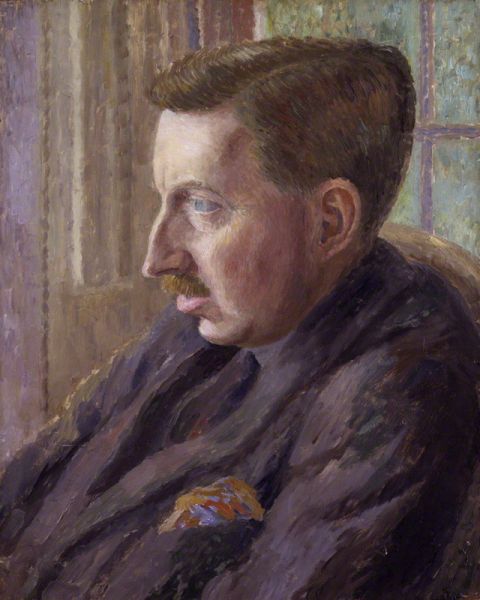A Room With a View Part 1
E. M. Forster: A Room With a View
I went with several family members to see the movie A Room With a View when it came out in 1985, and we were nearly the only ones in the theatre. We went during a week-day afternoon, which is typically a slow time, but I doubt a British movie set in 1905, with hoity-toity characers, would draw much of an audience at any showing, even with discounted prices. The movie-title, script, and story-plot are derived from a novel by the British writer E. M. Forster.
Oil-portrait by Dora Carrington, from Wikipedia
Still, the movie might appeal to you, if you like an unfolding love-story set in a scenic part of Italy, accompanied by the opera music of Puccini—and if you can imagine yourself walking the streets of Florence before the birth of the automobile, pneumatic drills, and sirens—before the advent of modern noise, in other words. The movie features Helena Bonham-Carter and Daniel Day-Lewis, among others, and follows a witty, intelligent script that stays true to the novel, So A Room With a View might make a deep impression on you, as it did on me.
A Room With a View concerns Lucy Honeychurch, a twenty-something woman from England who visits Italy with her chaperone Charlotte Bartlett, an older family friend who has never married. Witty dialogue carries the story through a silly mix-up regarding rooms. The two Britons requested rooms with a view of the Arno River in Florence. After much haggling, they finally get their rooms and go on tours of Florence with other guests of the hotel.
Something about A Room with a View will perplex the young-at-heart reader. The unbearably romantic vibes of the setting will go up against the dark, seemingly "civilized" forces that work against romance, even when the beauty of nature and the vitality of the characters most encourages it. The reader will want the characters to react positively to a love interest, and for some reason. it never happens.
In the chronological chapter 6, a group of Britons tour the beautiful Italian countryside. Forster gives the chapter a teasing title: "The Reverend Arthur Beebe, the Reverend Cuthbert Eager, Mr. Emerson, Mr. George Emerson, Miss Eleanor Lavish, Miss Charlotte Bartlett, and Miss Lucy Honeychurch Drive Out in Carriages to See a View; Italians Drive Them." The late Julian Sands plays George Emerson to Bonham-Carter's Lucy Honeychurch. George sees Lucy across a meadow, and overcome with feelings for her, he strides up to her, takes her in his arms, and kisses her.
Julian Sands in the background as George Emerson; Helena Bonham-Carter in the foreground as Lucy Honeychurch
The moment is so dramatic, the viewer knows the kiss will dominate the story. How the characters react to the kiss will determine whether it ends happily or not. While the kiss stirs Lucy and George and turns their world upside-down, they are too timid to do anything about it; and social strictures stand beside them to pounce negatively on their budding romance. George is raring to go, but he lacks social skills and adult orientation. Lucy dithers fatally, bedeviled by personal inertia. The resolution of those forces will determine the novel's outcome.
Forster's portrait of Lucy Honeychurch secures the novel's classic status. The title A Room With a View says it all. Her search for a room with a view amounts to a search for a point-of-view. C. G. Jung, the Swiss psychologist describes her "room" as the mental space that gives her selfhood, ego-strength, and a sense of direction and intentionality.
Again, the "room," as Carl Jung wrote about it, contains the sum of her personhood. From it, Lucy looks out at the world. In her case, the room has not coalesced; the "view" remains unfocused. She does not understand herself and cannot see a direction for her life. As Forster reveals to the reader again and again, "Lucy did not know what to do, or even what she wanted to do."
How does Lucy represent herself in an intimate setting? How does she talk coherently about herself, her "view" of things, his aspirations in life, how she represents life-changing experiences, how she gives her significant other an inkling of emotionally-charged reference points? In a group of people in a beautiful church, she could only ponder, "They were so serious and so strange that she could not remember how to behave."
Solitude oppresses Lucy. She needs others to confirm her views of anything. "It was dreadful not to know whether she was thinking right or wrong." She only feels comfortable in "the world of rapid talk, which was alone familiar to her." She hardly knows how to represent herself, except to repeat what others have said. To cover the gaps, she performs for people, but the lack of an authentic voice and a genuine personhood leave her frustrated, paranoid, and uninvolved. The advent of a romance brings her problems to the forefront. Condemned by a lack of authenticity, she veers toward a personal crisis.
End of Part One
Stay tuned for Part Two


